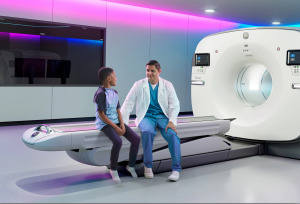by
Gus Iversen, Editor in Chief | March 19, 2024

GE Healthcare's all-digital PET/CT scanner, Omni Legend (Photo courtesy of GE Healthcare)
PET scan utilization is rising rapidly, according to a new report, which details the types of exams being performed, and the departments they are performed in.
In 2023 compared with 2022, the total volume of PET scans increased 10.2% year over year, according to IMV's
2024 PET Market Summary Report. The report is based on responses from 503 radiology/departmental administrators and clinicians who participated in IMV’s nationwide survey from March 2023 to January 2024.
The report found that 74% of PET scans in 2023 used the radiopharmaceutical F-18 FDG-PET. The next most commonly used radiopharmaceutical was Pylarify (9%) followed by rubidium (6%), gallium-68 (3%), copper-64 (2%) and F-18 sodium fluoride, Amyvid, and Axumin each accounting for 1%.



Ad Statistics
Times Displayed: 365801
Times Visited: 7089 Quality remanufactured Certified Centrifuges at Great prices! Fully warranted and backed by a company you can trust! Call or click for a free quote today! www.Centrifugestore.com 800-457-7576
The report also offers insight into the hospital departments that are conducing PET exams.
In 2023, 38% of PET scanners were operated by the PET department, 28% by nuclear medicine, 24% by radiology/imaging, 5% by radiation oncology, and 2% by molecular imaging.
By site type, 45% to 46% of hospitals with 200 beds or more operate their PET systems from a nuclear medicine department, while 49% to 54% of independent and hospital-owned sites operate theirs from a PET department. This could indicate that non-hospital sites may have a more specific focus on PET/CT exams, compared to a more broad integrative focus across nuclear medicine in hospital sites.
In terms of 2023 spending, the average radiopharmaceutical expenditure per fixed PET site is estimated to be $517,000.
Looking ahead, 67% of PET sites anticipate their procedure volumes will increase over the next 12 months, 28% expect them to stay the same, and 2% expect them to decrease.
The FDA’s recent approval of Leqembi (lecanemab), a monoclonal antibody that targets and helps destroy the hallmark beta-amyloid protein for Alzheimer's led CMS to announce in July 2023 that it would consider ending the once-per-lifetime limit on beta-amyloid PET scans. In a post-earnings call, GE HealthCare CEO Peter Arduini called this a
“profound growth opportunity” for all providers offering PET scans and molecular imaging.
According to data and analytics firm GlobalData, venture capital investments in U.S. radiopharmaceutical startups and emerging companies have
skyrocketed 550% over five years, driven by advancements, including theranostics, that have increased the precision and efficacy of these solutions in treating cancer.
Back to HCB News

